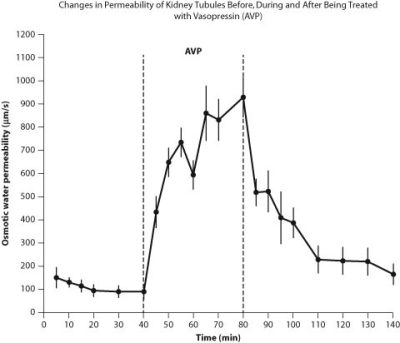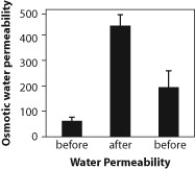Water movement is important in urine formation in the kidneys. Urine is formed when the blood is filtered by the kidneys into kidney tubules. Three figures are presented here that relate to how the kidney tubules respond to the administration of the hormone vasopressin. The direction that water flows in these figures is from the kidney tubules back into the blood.
 Figure A. Changes in permeability of tubules in the kidney in response to the hormone vasopressin (AVP) , which aids in osmoregulation.
Figure A. Changes in permeability of tubules in the kidney in response to the hormone vasopressin (AVP) , which aids in osmoregulation.
 Figure B. Density of aquaporins in kidney tubule cells before, during, and after administration of vasopressin.
Figure B. Density of aquaporins in kidney tubule cells before, during, and after administration of vasopressin.
 Figure C. Permeability of tissues to water before, during, and after administration of vasopressin.
Figure C. Permeability of tissues to water before, during, and after administration of vasopressin.
-Based on the data from these figures, what do you expect the urine of a person to be like when vasopressin is having an effect on the kidney tubules?
A) The urine will be salty.
B) The urine will be dilute.
C) The urine will be concentrated.
D) There will be large volumes of urine.
Correct Answer:
Verified
Q60: When a cell uses chemical energy to
Q61: Water movement is important in urine formation
Q62: Heating inactivates enzymes by
A) breaking the covalent
Q63: Water movement is important in urine formation
Q64: Americans spend up to $100 billion annually
Q66: Which part of the ATP molecule breaks
Q67: Which of the following is a coenzyme?
A)
Q68: Lipase is an enzyme released by the
Q69: A child is brought to the hospital
Q70: How does inhibition of an enzyme-catalyzed reaction
Unlock this Answer For Free Now!
View this answer and more for free by performing one of the following actions

Scan the QR code to install the App and get 2 free unlocks

Unlock quizzes for free by uploading documents